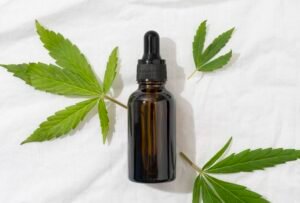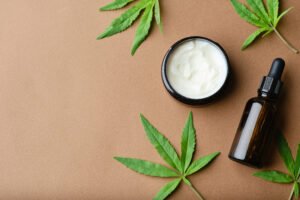Hemp, scientifically known as Cannabis sativa L., is a remarkably versatile plant cultivated for an array of applications. From foods and health products to fabric, rope, natural remedies, and much more, hemp’s utility is truly diverse. This plant’s various parts serve as the foundation for creating different products, each with its unique benefits.
One of the most notable aspects of hemp is its edible and highly nutritious seeds, known as Hemp Seeds. These seeds are celebrated for their nutritional richness and are particularly high in dietary fiber. In addition to fiber, they also contain essential fatty acids, including omega-3 and omega-6. These fatty acids play a crucial role in promoting heart and skin health, making hemp seeds a valuable addition to one’s diet.
Also Read: Best Rolling Papers for Joints
A common misconception surrounding hemp is its association with marijuana. While both hemp and marijuana belong to the same genus and species, they differ significantly in their chemical composition and effects. Hemp, unlike marijuana, contains only trace amounts of THC (tetrahydrocannabinol), the primary psychoactive compound responsible for the high associated with marijuana use. Due to its minimal THC content, hemp is primarily grown for non-drug purposes, distinguishing it from marijuana.
The history of hemp in the United States is intriguing. In 1937, the Marijuana Tax Act imposed a nationwide ban on hemp production. Subsequently, in the 1970s, it was categorized as a Schedule 1 federally controlled substance, alongside cannabis. It was not until the passage of the 2018 Farm Bill that industrial hemp regained legal status in the United States. This legislative change opened the doors to a wide range of applications, emphasizing hemp’s versatility.
Hemp’s potential extends beyond dietary use; it serves as a valuable resource for producing fabrics, plastic alternatives, biodegradable paper bags, pet bedding, biofuel, and a variety of food products. The seeds, in particular, are an essential component of hemp’s utility, holding the FDA’s generally recognized as safe (GRAS) designation as a food product.
It’s imperative to differentiate hemp from its cannabis counterpart in terms of THC content. Hemp plants are characterized by minimal THC levels, which are insufficient to induce any psychoactive effects. Consequently, consuming hemp seeds or products derived from hemp will not result in the high commonly associated with marijuana use. Hemp seeds offer a wide range of health benefits, making them a valuable addition to a balanced and nutritious diet.
Also Read: Blackberry Kush Strains
Health Uses of Hemp Seeds
Hemp, with its legal status in the United States, has garnered attention for its wide array of applications, often being considered a potential remedy for various purposes. It’s important to note, though, that while hemp is gaining popularity, there is a lack of comprehensive clinical research data to definitively establish its safety and effectiveness for treating specific medical conditions.
One of the primary ways in which people harness the potential of hemp is by incorporating various hemp-based products into their daily routines. Hemp seeds, hemp oil, and hemp protein have gained prominence for their nutritional benefits. Hemp oil, in particular, finds utility in skincare as a conditioner and moisturizer, offering a natural and sustainable alternative for skincare enthusiasts.
Hemp seeds, readily available in most grocery and health food stores, offer versatility in how they can be integrated into your diet. Some of the most common and popular applications include:
1. Blending them into Smoothies: Hemp seeds can be a nutritious addition to your morning or post-workout smoothies, enhancing their texture and providing a boost of essential nutrients.
2. Topping Salads or Yogurt: Sprinkling hemp seeds over salads or yogurt not only adds a delightful crunch but also contributes to the nutritional profile of your meal.
Also Read: Super Lemon Haze
3. Baking Hemp Seeds into Muffins: Get creative in the kitchen by incorporating hemp seeds into your muffin recipes. This not only adds a unique texture but also enhances the overall nutritional value of your baked goods.
4. Making Homemade Hemp Milk: For those looking for a dairy-free milk alternative, hemp seeds can be used to create homemade hemp milk. It offers a creamy and nutty-flavored option for various culinary applications.
The versatility of hemp and its various derivatives provides individuals with ample opportunities to explore and experiment with this multifaceted plant. Whether you’re seeking the nutritional benefits of hemp seeds, the conditioning properties of hemp oil for your skin, or innovative ways to incorporate hemp into your meals, there’s a growing spectrum of options to explore. While ongoing research continues to shed light on the full extent of hemp’s potential, it’s essential to keep an eye on emerging developments and trends in the world of hemp-based products.
Health Benefits of Hemp Seeds
Hemp seeds, often referred to as hemp hearts, are a nutritional powerhouse. With over 30% of their content comprising healthy fats, they stand out for their rich stores of essential fatty acids. Notably, hemp seeds are abundant in alpha-linolenic acid (omega-3) and linoleic acid (omega-6). The balance of these essential fatty acids in hemp seeds, typically at a ratio of 2:1 or 3:1, is considered optimal for promoting human health.
Also Read: Marijuana Allergies
Beyond their fatty acid content, hemp seeds are a valuable source of protein, constituting approximately 25% of their calorie composition. These unassuming seeds offer an array of significant health benefits, contributing to overall well-being.
Fostering Healthy Digestion
Hemp seeds are an excellent source of dietary fiber, offering both soluble and insoluble fiber types that are crucial for digestive health. A well-functioning digestive system is essential for preventing issues like constipation. Moreover, maintaining an adequate fiber intake is linked to a reduced risk of developing various health conditions, including heart disease, diabetes, and colon cancer.
It’s worth noting that while hemp seeds are rich in fiber, the majority of this nutrient resides in their hulls. Hulled hemp seeds, often known as hemp hearts, have had their outer layer removed, rendering them significantly lower in fiber content.
Supporting Heart Health
Fiber, found in hemp seeds, plays a pivotal role in lowering cholesterol levels, a critical aspect of maintaining a healthy heart. Hemp seeds bring even more heart-boosting elements to the table, including omega-3 and omega-6 fatty acids, along with the amino acid arginine.
Arginine, in particular, contributes to the production of nitric oxide, a vasodilator that relaxes blood vessels, thus reducing blood pressure and diminishing the risk of heart disease. Arginine also has the potential to decrease C-reactive protein levels, further fortifying heart health.
Alleviating Inflammation
In addition to omega-3 and omega-6 fatty acids, hemp seeds harbor gamma-linolenic acid (GLA), which has shown promise in animal studies for its potential anti-inflammatory properties. While more research is needed to confirm its efficacy in humans, reducing inflammation can be a crucial step in mitigating the risk of developing various conditions, including type 2 diabetes, heart disease, arthritis, and non-alcoholic fatty liver disease.
Nurturing Skin Health
Inflammation can play a significant role in skin conditions such as acne and atopic dermatitis. Furthermore, inadequate intake of omega-3 fatty acids may lead to skin issues. Some studies suggest that increasing omega-3 consumption may alleviate the symptoms of skin conditions and enhance skin health, including the management of acne.
Alleviating PMS and Menopause Symptoms
Gamma-linolenic acid (GLA) present in hemp seeds helps produce prostaglandin E1, which can reduce the effects of prolactin, especially those contributing to premenstrual syndrome (PMS) symptoms like breast tenderness, irritability, and water retention. Additionally, GLA may aid in the reduction of menopausal symptoms by addressing hormone imbalances and inflammation, offering relief during this transitional phase of life.
Also Read: Marijuana for Prostate Cancer
Side Effects of Hemp Seeds
While hemp seeds are generally considered safe for consumption, it’s essential to be aware of potential side effects, although they are relatively rare. These side effects may include:
1. Throat Irritation: Some individuals may experience mild throat irritation when consuming whole hemp seeds. This is typically temporary and not a cause for major concern.
2. Diarrhea: In some cases, excessive consumption of hemp seeds can lead to digestive issues, including diarrhea. It’s advisable to moderate your intake to avoid this effect.
3. Nausea and Vomiting: Although uncommon, a few individuals might experience nausea or vomiting after consuming hemp seeds. This is more likely when consumed in excessive quantities.
4. Bradycardia (Slow Heart Rate): Some anecdotal reports suggest that consuming a significant amount of hemp seeds may lead to a temporary slowing of the heart rate, known as bradycardia. However, this effect is not well-documented in clinical research.
5. Hypertension (High Blood Pressure): There have been rare cases of increased blood pressure associated with hemp seed consumption, but this effect is not widely reported. It’s crucial to monitor your blood pressure if you have concerns.
It’s important to note that these side effects are not common and often occur when hemp seeds are consumed in excessive amounts. To minimize the risk of side effects, it’s advisable to enjoy hemp seeds in moderation and observe your body’s response. If you are pregnant, breastfeeding, or considering using hemp topically on your skin, it’s essential to consult with a healthcare professional, as there is limited clinical research data to establish its safety in these specific scenarios. Always exercise caution and seek guidance if you have any concerns regarding the use of hemp seeds.
FAQs
Q. What are hemp seeds, and how are they different from marijuana?
A. Hemp seeds are the edible seeds of the hemp plant, Cannabis sativa L. While they belong to the same plant species as marijuana, they have minimal levels of THC (the psychoactive compound) and do not produce a high when consumed.
Q. What makes hemp seeds a nutritious food source?
A. Hemp seeds are highly nutritious, containing over 30% healthy fats and essential fatty acids (omega-3 and omega-6). They are also rich in dietary fiber, which is crucial for heart and skin health.
Q. Are there any health benefits associated with consuming hemp seeds?
A. Yes, hemp seeds offer several health benefits. They support healthy digestion, improve heart health by lowering cholesterol levels, have anti-inflammatory properties, and may contribute to better skin health. They can also help alleviate symptoms of PMS and menopause.
Q. How can hemp seeds be used in our diet?
A. Hemp seeds can be blended into smoothies, used as toppings for salads or yogurt, baked into muffins, and even used to make homemade hemp milk. Their versatility makes them an excellent addition to various recipes.
Q. Are there any side effects or risks associated with consuming hemp seeds?
A. While hemp seeds are generally safe for most people, overconsumption may lead to digestive discomfort. In rare cases, some individuals may experience throat irritation. Pregnant and breastfeeding individuals should use caution, and topical use safety remains uncertain.
Q. Can hemp seeds get you high like marijuana?
A. No, hemp seeds contain only trace amounts of THC, which is insufficient to induce any psychoactive effects. They do not produce a high.








